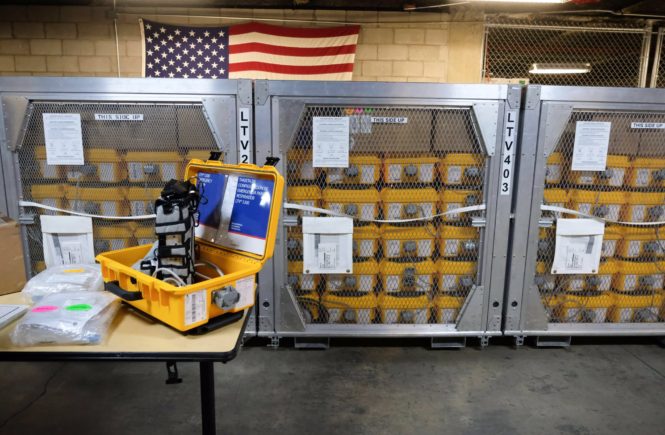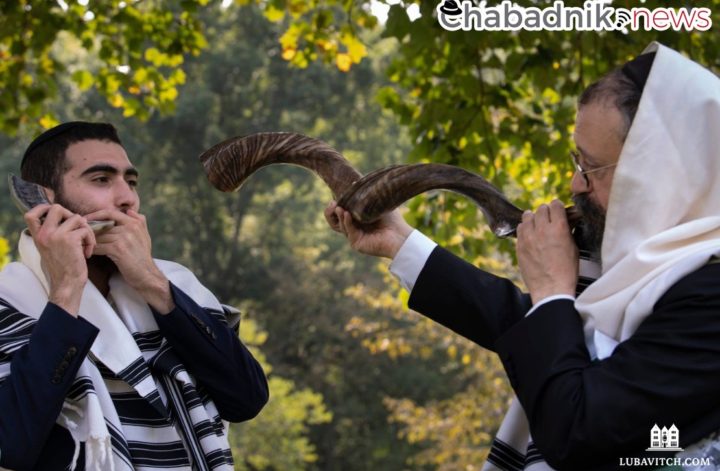An interview with Aliza Silberstein, who fled with her family. including nine children

I woke up at 4 a.m. this past Friday morning; I couldn’t fall back asleep. Late Thursday afternoon, I had interviewed Aliza Silberstein, Chabad-Lubavitch emissary to Chernigov, Ukraine. She had just arrived to safety in Romania after a 50-hour, harrowing journey.
She and her husband, Rabbi Yisroel, escaped with nine of her ten children, the youngest, toddler twins, together with some community members. She was holding a baby in her arms as we spoke. Her oldest, a fifteen-year-old boy, had been studying in a Ukrainian yeshivah and had been evacuated to Germany with his fellow students. Aliza and her husband had been determined to stay and help the people of their community, until the last possible moments, which arrived a few days ago.
Though my eyes have been glued to the news ever since this war began, the repercussions of thousands of refugees fleeing, whole cities being flattened, and families hiding in their basements is incomprehensible. But the account of one family, one real individual speaking heart-to-heart of her trauma, touched me to the core.
And that’s why I was tossing and turning in the middle of the night. Aliza is a young mother; my guess is that she is not much older than my oldest daughter. She grew up in Morristown, N.J., a half-hour drive from my home. She had chosen a life of service as a Chabad emissary, dedicating her life to reaching out to and loving every Jew. I’m sure she knew when she settled in far-away Ukraine that her life would be different than in North America, but she could never have imagined living through a war, and fleeing as a refugee.
Thoughts About Her Community
Aliza’s sweet smile as she held her baby flashed through my mind. She put up a brave front, talking in a calm demeanor that belied the turmoil that she had experienced. She kept emphasizing her trust in G‑d, her steadfast faith in fulfilling her purpose. Even as a refugee in Romania, dealing with the trauma of her own young children, her thoughts were about her community—those who escaped with her and those who remained behind—and on securing buses and transportation for them to flee to freedom.
I can’t stop thinking about you and your family, I texted her in the middle of the night. I pictured my own rambunctious one-year-old twin grandsons, and couldn’t fathom how she was managing on the run, with her young children.
Did your children sleep through the night? Do you even have cribs and diapers for your babies? I thought about my young grandchildren, who need a dark, quiet room, white noise and a soothing nighttime ritual to comfort them to fall asleep.
Aliza had escaped with just the clothes on her back. Her family had been hiding out in a makeshift bunker in her basement in the days before they left. Only when there was a lull in the bombing could they run upstairs to use the bathroom or snatch something necessary, before hastily returning. When the bombing got so bad and it was time for them to escape, she quickly threw together basics: food, diapers, pajamas for the children, and grabbed her ketubah(marriage document) and wedding ring, dumping it all in two suitcases. In the haste, one suitcase got left behind.
Imagine having just a few minutes to grab only basics from all your worldly possessions and prioritizing things like food, diapers and wipes for your journey forward.
“We are lucky to be alive and safe,” was all Aliza had said about leaving everything behind. I was dumbfounded as she stressed over and over her faith in G‑d and that everyone goes through difficulties that they grow from, and how G‑d has a plan for us all.
Aliza explained that it was actually divine providence that they had recently bought a car. Otherwise, there would have been no way out, since it was impossible to hire drivers in a war-torn country.
She responded to my text: My kids did sleep through the night. It did take a while for my babies to fall asleep, so I didn’t get to sleep till after two. I do have diapers, but no cribs, so I had them with me on the floor.
I quickly texted: Do you have food for Shabbos? How are you managing?!
Leaving Everything Behind
How do you ask someone who has just left everything behind what they have and what they need? My questions felt so meaningless; my telling her how “brave and incredible” she is sounded hollow. I’m sure she didn’t want to be so incredible right now.
We are cooked for Shabbos, she responded in a voice note. There’s a bunch of other people with us. We actually found more people from our community that are on their way through the border. We are going to be hosting people and I will be able to continue to help them out too.
I had asked Aliza in my interview what we could do for her. She responded to pray, do extra mitzvot, and donate to the Ukraine Jewish Relief Fund. During the hours of her escape, with bombs exploding all around her, she felt comforted in knowing that people were praying for her safety.
Just a few weeks ago, Aliza was a busy young mom, taking care of her large family. She was debating which tiles to choose for her almost-completed community mikvah. She was an inspirational shlucha, working for the spiritual and material needs of the community she calls family.
And incredibly despite the harrowing conditions that she has experienced, the strength of her conviction hasn’t changed. Behind her gentle demeanor is a strength and belief that burns brightly—even brighter than the bombs from which she escaped.
The Ukraine Jewish Relief Fund has been established to help provide assistance to the Jewish communities in Ukraine impacted by the war.
Click here for a prayer you can say and a list of good deeds you can do in the merit of the protection of all those in harm’s way.
Watch the full interview:



